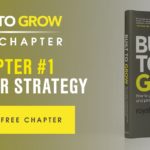
My intrigue as to why some businesses thrive and others don’t has been with me all my working life. When buffeted by turbulent events and prevailing head winds, or hit by big, fast-moving forces that they can neither predict nor control, what distinguishes those successful businesses who perform exceptionally well from those who underperform or worse, go under? Surely you set out with the aim of building a successful business?
Was business success down to:
- Successful leaders being bold, risk-seeking visionaries?
- Innovation?
- Speed?
- Radical change?
- Or, just good luck?
Perhaps a combination of these factors were at play.
During my time in business, I’ve learned a thing or two about how to be successful in business and what you need to know to build a successful business.
8 principles for building a successful business
#1 Know your ‘WHY you do what you do’
Think for a moment about WHY you do what you do?
Most people, when asked WHAT they do, can speak about it at length. They might have a quick answer, and when pressed, will give you tons of details about the logical, technical and procedural aspects of their business. You are probably the same. We don’t have any difficultly at all explaining our WHAT.
But let me ask you something different: Why do you do what you do? What’s the purpose behind it? What made you decide to do it in the first place?
The problem with answering these questions is that for many, they either aren’t sure, or they’ve completely lost touch with their reason.

When you are able to answer not just WHAT you do, but elaborate the reasons WHY you do it, it will change the way you make decisions and the value you place on things.
It’s the point you acquire real purpose. Your WHAT becomes nothing more than a means of delivering your WHY.
But is a compelling WHY really that important?
The third most watched TED talk, with more than 25 million views is on the very subject of finding your WHY. Called ‘How great leaders inspire action’, management expert Simon Sinek speaks exclusively about the importance of finding your why.
We all have the need to be part of something; to do something that has some bigger meaning.
We all need to find our WHY.
#2 Spend YOUR time wisely

You may have heard me talk on the importance of time.
In managing and growing your successful business there will be areas which you enjoy and are good at and there will be areas which are daunting.
Here’s the great news. You don’t need to be great at everything!
Yes, you will still need to dip in an out of the broad facets of running a business. This will never change. That’s what we do as owners, leaders or entrepreneurs.
What can change, is the areas that get your attention and the level of involvement needed from you.
Put in place people, resources, partners who will support you. The growth of outsourcing functions such as HR, Marketing, Finance and the creation of virtual teams you tap in to as & when you need it means you don’t have the overhead/costs directly but you do have the expertise to hand.
But a word of caution.
Don’t fall into the trap of getting bogged down in the everyday operational stuff, in the weeds sorting out problems and challenges. You’ll feel like your trapped, boxed and in a prison, whilst the people you hire are doing all the exciting, fun parts of the business.
Change it.
Re ignite your passion, re connect with your personal WHY, what you really enjoy doing and where you add most value for the business. Play to your strengths and yes, use these strengths to help others improve but don’t lose your opportunities to use your strengths. Let others help you overcome your weaknesses.
#3 Be consistent in action

Disciplined execution is key to business success. Consistency with vision and values, consistency with short, medium and long term goals, consistency with performance standards and culture, consistency with method and approach. Being consistent over time.
Successful businesses are relentless in their focus and quest for disciplined execution. They find out what works, and then replicate it!
Don’t overreact to events, don’t knee jerk, don’t succumb to the herd. Don’t leap for alluring but irrelevant opportunities which can detract you from your core focus and specialism.
Successful businesses are capable of immense perseverance and unyielding in their standards and disciplines. They constantly push themselves to find better and faster ways to merge the present with the future, and realise their goals.
Understand the ‘Law of Diminishing Intent’ and make sure it doesn’t happen to you.
What is this law?
It’s simply, the longer you wait to implement a new idea or strategy, the less enthusiasm you will have for it.
You’ve probably had that feeling when you’re full of great ideas. But then (and here comes the but) the demands of the day compete for your attention, and all of your good intentions and personal promises for change get pushed to the wayside. And the longer you put them off, the lower the probability you will ever actually fulfill them.
So, the underlying message; become disciplined in disciplined execution on your strategy and ideas before they die a quick death, burying your future goals and vision with them.
#4 Create a strategic plan

You are in the driver’s seat of your business and you have to have a plan which translates how you’re going to turn your WHY into reality.
You cannot leave it to chance. Business success is not an accident.
You may have a business plan; a plan used to initially start your business and obtain funding. The business plan covers the ‘who’ and the ‘what’
I’m talking about a Strategic Plan.
A plan for implementing and managing the strategic direction of your business. The strategic plan covers the ‘how’ and ‘when’. Put simply, the strategic plan is the action plan for your business. It’s the task, milestones and steps needed to drive your business forward. It typically covers a 3-5-year period broken down into specific yearly and quarterly goals.
You are the architect of your destiny and should have in place;
- 3-5-year strategic plan
- 3-year line of sight on target financial goals
- 12-month plan detailing strategic priorities and milestones
- 90-day tactical plan or to do list
Initially you will need to invest time to create your plan, but you will reap the benefits as you make regular reality checks against your plan to evaluate what’s working and what isn’t and make timely adjustments along the way and adjust course where needed.
#5 Look at yourself through your customers’ lens

Become fanatical about your customers. Adopt ‘outside in’ thinking to ensure your customer is the focal point of everything you do and how you do it.
You want your business to be a success so don’t invest all your life savings, energy or resources developing your dream unless it meets your target customers perceived need or want.
‘Why should your customers buy from you?’
Ask yourself this question every day.
Why?
Because in a fiercely competitive world, your competition is trying to poach your customers; competitors that you could know well, new entrants appearing from nowhere, and old rivals who have got their act together and are on the offensive.
The market place is ultra-competitive, and complacency is not an option.
Offering a good product, even when it meets your customers’ needs and wants won’t cut it. You’ve got to have a great product or service.
You have to stand out. You have to be able to answer the question ‘why should I buy from you?’
#6 Make sure you’re easy to do business with
We have an innate ability to over complicate and over engineer life and this certainly applies in business.
Would you describe your business as being like a tugboat or an oil tanker?

In the early stages of the life of a business it is fast, agile, responsive, and able to move quickly (the tug boat).
The challenge is that over time we start to introduce complexity: additional layers of people in the organisational design, multiple sign-off processes and procedures, key performance indicator overload, an unhealthy obsession for governance, reports for the sake of reports, decision-making by committee, and – perhaps worst of all – bureaucracy that makes it difficult for a customer to do business with you (the oil tanker).
Perhaps utopia is to have the scale and size of an oil tanker, yet have the mentality and agility of the tugboat!
#7 Talk benefits
A feature is what the product has or what a product is.
An advantage is what the product does.
A benefit is how the product improves the customer experience or solves a problem.
Features of your product should only become apparent after the benefits have been communicated, absorbed, and acknowledged by the customer.
If your customers are able to answer ‘what’s in it for me?’ you have been talking benefits.

And I promise you, they’ll be the ones leading the features and advantages conversation (‘so how does it work?’, ‘does it do this?’).
Combine this with a healthy obsession with delivering an outstanding customer experience and the prize could be bigger than anything you’ve ever imagined. Your customers will become your raving rans who will go out into the world and tell their friends, neighbours, and colleagues just how good you are.
But you have to walk the talk. You have to be good at what you do.
#8 Stay on top of your cash flow

Managing your cash flow is critical and can be what stifles your growth potential if you get it wrong. Your cash management strategy is fundamentally about one measure: your debtor to creditor ratio.
Nearly every business is both a creditor and a debtor and proactively managing the ratio between these two levers is key to being able to fund your growth ambitions.
When I work with business owners and we start drilling into their financials, cash management and, even more specifically, debtor to creditor management comes up as a key discussion area, without fail.
Why?
You are not a bank. You are not there to provide a free credit facility for your customers, yet too many businesses indirectly fall into this trap. Don’t let your debtors treat you like one. It will cripple your growth potential and will lead to sleepless nights because you simply won’t have the cash to pay your people or your bills.
It doesn’t have to be this way.
Consider how creative you are in positioning your value proposition and the associated payment terms and your ability to negotiate effective terms with your suppliers and partners.
Stage payments are a sound financial strategy in business today as is credit checks. Where feasible make credit checking at integral part of your up-front processes. Check a customer’s credit rating at the point of doing business with them.
It’s not just debtors paying late that will stifle your growth. The potential of having to write off a bad debt could be the difference between a building a successful business or building a business set for failure. Don’t fall into this trap.
Remember, turnover is vanity, profit is sanity and cash is reality!

